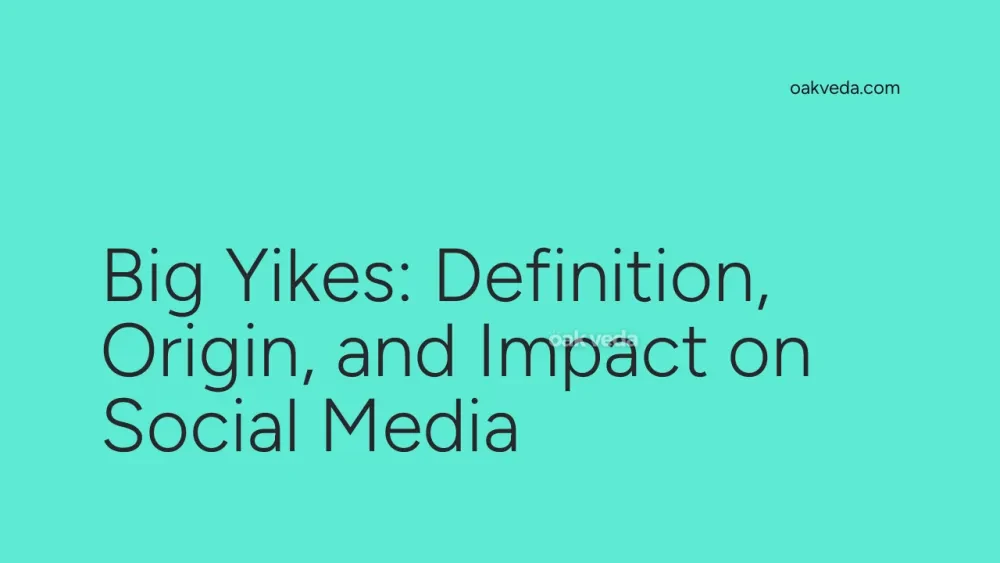
What is Big Yikes?
"Big Yikes" is a popular social media expression used to convey strong disapproval, shock, or embarrassment in response to a situation or statement. It's an intensified version of the already expressive term "yikes," which itself communicates surprise or unease. The addition of "big" emphasizes the magnitude or severity of the reaction, making it a go-to phrase for those moments when a simple "yikes" just won't cut it.
Origin and Development of Big Yikes
The term "Big Yikes" emerged in the early 2010s as internet slang evolved to capture more nuanced reactions. While "yikes" has been part of casual English vocabulary for decades, the addition of "big" as an intensifier gained traction on social media platforms, particularly Twitter and Tumblr. As users sought ways to express heightened reactions to increasingly outrageous or cringe-worthy content, "Big Yikes" filled a linguistic niche.
How Big Yikes Works
"Big Yikes" functions as a versatile reaction in online communication. It's typically used in the following ways:
- As a standalone comment: Users often reply with just "Big yikes" to express their reaction.
- In a sentence: For example, "That's a big yikes from me, dawg."
- As a hashtag: #BigYikes is used to categorize posts or add commentary.
The phrase works by immediately conveying the user's strong negative reaction without requiring further explanation, making it efficient for quick online interactions.
Popular Examples of Big Yikes
"Big Yikes" has been used in various contexts across social media:
- Reacting to political gaffes or controversial statements by public figures
- Commenting on embarrassing celebrity moments or PR disasters
- Responding to personal anecdotes of awkward or uncomfortable situations
- Captioning memes that depict cringe-worthy scenarios
Impact of Big Yikes on Social Media Culture
The widespread adoption of "Big Yikes" reflects broader trends in social media communication:
- Emphasis on brevity: It encapsulates a complex reaction in just two words.
- Meme culture: The phrase often accompanies or becomes part of memes.
- Emotional expression: It allows users to convey strong feelings quickly and effectively.
- Community building: Using shared language like "Big Yikes" helps create a sense of in-group belonging among social media users.
Controversies or Debates Surrounding Big Yikes
While "Big Yikes" is generally seen as a harmless expression, some debates have arisen:
- Overuse: Critics argue that the phrase has become cliché due to its popularity.
- Tone concerns: Some feel it can be dismissive or minimize serious issues when used inappropriately.
- Generational divide: Older users may find the term confusing or unnecessary, highlighting generational differences in online communication.
How Brands and Influencers Use Big Yikes
Savvy brands and influencers have incorporated "Big Yikes" into their social media strategies:
- Brand voice: Some companies use it to appear more relatable and in touch with younger audiences.
- Crisis management: Brands might acknowledge their mistakes with a self-deprecating "Big Yikes" to diffuse tension.
- Content creation: Influencers may use the phrase in captions or video content to react to trends or situations.
- Engagement: The term can be used to encourage follower interaction, e.g., "Share your biggest yikes moment in the comments!"
Future Trends Related to Big Yikes
As social media language continues to evolve, we can expect:
- New variations: Just as "Big Yikes" expanded on "yikes," new intensifiers or modifications may emerge.
- Cross-platform adoption: The phrase may gain traction on emerging platforms or in different online communities.
- Integration into mainstream language: Like other internet slang, "Big Yikes" could find its way into everyday offline conversations.
- Potential decline: As with many trendy expressions, overuse might lead to a decrease in popularity, making way for new terms.
FAQs about Big Yikes
Q: Is "Big Yikes" appropriate for professional communication? A: Generally, it's best to avoid using informal internet slang like "Big Yikes" in professional settings unless the context is very casual and you're certain it will be well-received.
Q: Can "Big Yikes" be used positively? A: While primarily used for negative reactions, some users employ it ironically or sarcastically in positive contexts, though this usage is less common.
Q: Are there cultural differences in the use of "Big Yikes"? A: Yes, the phrase is most common in English-speaking online communities, particularly among younger users. Its use and understanding may vary in different cultural contexts.
Q: How do you pronounce "Big Yikes"? A: It's pronounced exactly as it's spelled: "big" like the opposite of small, and "yikes" rhyming with "bikes."
In conclusion, "Big Yikes" has cemented its place in the lexicon of social media, offering users a quick and expressive way to react to the often overwhelming or absurd nature of online content. As with all internet slang, its usage continues to evolve, reflecting the dynamic nature of digital communication. Whether you're a casual social media user or a brand looking to connect with audiences, understanding terms like "Big Yikes" can help navigate the ever-changing landscape of online interaction.
You may be interested in:
- Quiet Quitting: Definition, Origin, and Impact
- Carousel Ads: Definition, Origin, and Impact on Social Media
- Brand Authenticity: Definition, Origin, and Impact
- POV Video: Definition, Origin, and Impact on Social Media
- Sleep On: Definition, Origin, and Impact on Social Media
- Hoo.be: Definition, Origin, and Impact on Creator Marketing

